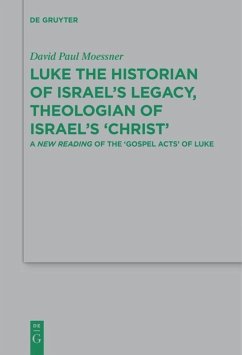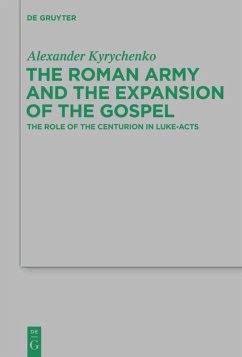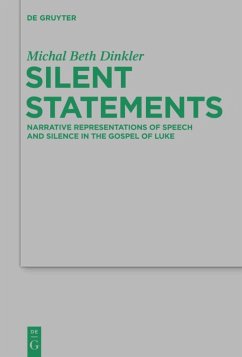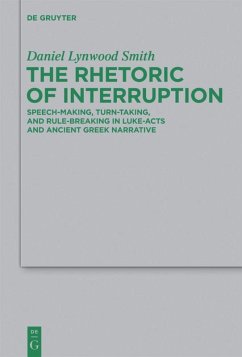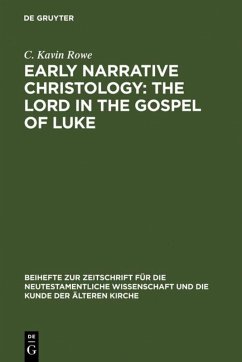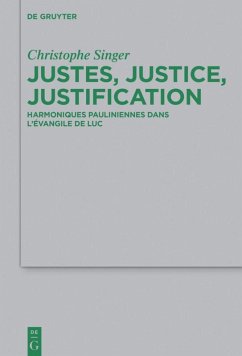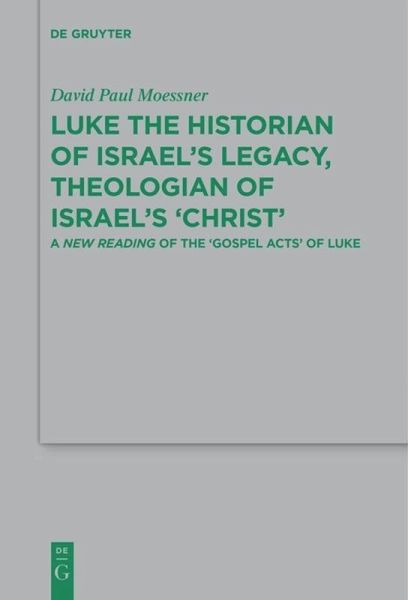
Luke the Historian of Israel's Legacy, Theologian of Israel's 'Christ'
A New Reading of the 'Gospel Acts' of Luke
Versandkostenfrei!
Versandfertig in 1-2 Wochen
119,99 €
inkl. MwSt.
Weitere Ausgaben:

PAYBACK Punkte
60 °P sammeln!
Luke is the first New Testament author to reflect on the Jewish scriptures as written rolls bunched together along a twofold (â??Moses and all the prophetsâ?), or threefold collection (â??the law of Moses and the prophets and the psalmsâ?) that point together severally, and as a whole to the â??Messiah Jesus who must suffer.â? Thus Luke is already conceiving a proto-Bible that anticipates the â??bookâ? of the third/fourth century CE when the first Christian Bibles or codices of Vaticanus and Sinaiticus will have emerged. As the first ?biblicalâ?? theologian Luke construes scriptural texts as encompassed by an overarching principle of divine â??plan.â? As a Hellenistic historian, Lukeâ??s â??plan of Godâ? epitomizes the divine activity and ?controlâ?? of ?historicalâ?? development. As biblical theologian and Hellenistic historian, Luke perceives in both the whole and the parts of â??the scripturesâ? a coherent rationale of divine intent and action for Israel that comprehends all of Israelâ??s history. Lukeâ??s divine ?planâ?? is thus ?arrangedâ?? into a narrative plan that re-presents the divine fulfillment as a scriptural necessity in the life, death, and exaltation of Israelâ??s Christ (Luke) and witness of Messiah through his followers ?to the end of the earthâ?? (Acts).
David Moessner proposes a new understanding of the relation of Luke's second volume to his Gospel to open up a whole new reading of Luke's foundational contribution to the New Testament. For postmodern readers who find Acts a 'generic outlier,' dangling tenuously somewhere between the 'mainland' of the evangelists and the 'Peloponnese' of Paul-diffused and confused and shunted to the backwaters of the New Testament by these signature corpora-Moessner plunges his readers into the hermeneutical atmosphere of Greek narrative poetics and elaboration of multi-volume works to inhale the rhetorical swells that animate Luke's first readers in their engagement of his narrative. In this collection of twelve of his essays, re-contextualized and re-organized into five major topical movements, Moessner showcases multiple Hellenistic texts and rhetorical tropes to spotlight the various signals Luke provides his readers of the multiple ways his Acts will follow "all that Jesus began to do and to teach" (Acts 1:1) and, consequently, bring coherence to this dominant block of the New Testament that has long been split apart. By collapsing the world of Jesus into the words and deeds of his followers, Luke re-configures the significance of Israel's "Christ" and the "Reign" of Israel's God for all peoples and places to create a new account of 'Gospel Acts,' discrete and distinctively different than the "narrative" of the "many" (Luke 1:1). Luke the Historian of Israel's Legacy combines what no analysis of the Lukan writings has previously accomplished, integrating seamlessly two 'generically-estranged' volumes into one new whole from the intent of the one composer. For Luke is the Hellenistic historian and simultaneously 'biblical' theologian who arranges the one "plan of God" read from the script of the Jewish scriptures-parts and whole, severally and together-as the saving 'script' for the whole world through Israel's suffering and raised up "Christ," Jesus of Nazareth.In the introductions to each major theme of the essays, this noted scholar of the Lukan writings offers an epitome of the main features of Luke's theological 'thought,' and, in a final Conclusions chapter, weaves together a comprehensive synthesis of this new reading of the whole.




